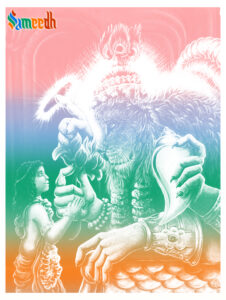The story of Prahlad and his devotion to Lord Vishnu is a significant narrative found in various Hindu scriptures, including the Varaha Puran. Prahlad is a legendary figure known for his unwavering faith in Lord Vishnu, despite being the son of the demon king Hiranyakashipu.

Hiranyakashipu, a powerful demon, receives a boon that makes him virtually invincible. He becomes arrogant and considers himself as the supreme ruler, demanding that everyone worship him instead of the gods. Hiranyakashipu has a son named Prahlad, who is an ardent devotee of Lord Vishnu right from his birth. Despite being born in a demoniac family, Prahlad remains devoted to the benevolent deity.
Prahlad’s devotion to Vishnu infuriates Hiranyakashipu. He tries to force Prahlad to worship him instead, but Prahlad refuses, stating that Vishnu is the supreme Lord. Hiranyakashipu attempts to kill Prahlad through various means, including poison, trampling by elephants, and throwing him from a mountain. However, each time, Prahlad remains unharmed due to the protective grace of Lord Vishnu.
Narasimha Avatar:
- Finally, Hiranyakashipu challenges Prahlad, asking if Vishnu is present everywhere. Prahlad confidently answers yes. In response, Hiranyakashipu points to a pillar and asks if Vishnu is in it. To everyone’s surprise, Lord Vishnu manifests as Narasimha (a half-man, half-lion incarnation) from the pillar.
The Triumph of Devotion:
- In a fierce battle, Narasimha defeats Hiranyakashipu, thereby fulfilling the boon granted to the demon. However, Narasimha does so at dusk, in a threshold, using his claws, demonstrating that the Lord’s divine intervention transcends the conditions of the boon.
Prahlad’s Blessings:
- Prahlad, undeterred by the chaos, remains devoted to Lord Vishnu. After the battle, Narasimha blesses Prahlad for his unwavering faith, making him a righteous and benevolent ruler.
Prahlada’s story illustrates the triumph of devotion, righteousness, and the divine intervention of Lord Vishnu. It is often cited as an example of how sincere and unshakable faith in the divine can lead to divine protection and liberation. This narrative is not only found in the Varaha Puran but also in other major Purans like the Bhagavat Puran and the Vishnu Puran.
Prahlad’s story and his devotion to Lord Vishnu are closely associated with the festival of Holika Dahan and Holi, which are widely celebrated in India. The festival usually takes place in March, marking the arrival of spring. The specific day is known as Holika Dahan, which is observed on the night before the festival of colors, Holi.
Holika Dahan involves the ritual burning of bonfires on the night before Holi. The bonfire symbolizes the victory of good over evil, with Holika, the demoness, being burnt in the fire. Holika had received a boon that made her immune to fire, but due to her evil intentions, the boon was turned against her. Prahlad’s devotion and Lord Vishnu’s protection play a significant role in this story.
